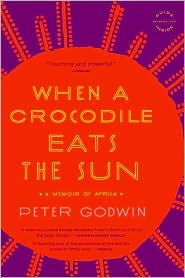 I admit, I'll pick just about any book about Africa, and perhaps such books don't thrill the general audience (see, for example, A History of Post-Colonial Lusophone Africa). I don't really care. When a book is this good it doesn't matter. Peter Godwin's When a Crocodile Eats the Sun is without question the most deeply felt book I've read in a long time.
I admit, I'll pick just about any book about Africa, and perhaps such books don't thrill the general audience (see, for example, A History of Post-Colonial Lusophone Africa). I don't really care. When a book is this good it doesn't matter. Peter Godwin's When a Crocodile Eats the Sun is without question the most deeply felt book I've read in a long time.That does not mean it made me weep openly, or laugh out loud (certainly not that). When I picked it up, I was looking for something about the recent crisis in Zimbabwe, maybe some background on what might have changed in Robert Mugabe that he no longer about his country and only himself, and perhaps maybe a look inside the country at what it's like for the ordinary folks there. I was, I will admit, a bit disappointed that Mr. Godwin, whose picture appears on the back, is white. For shame, Smitty, for shame.
This is not a backgrounder on the crisis or even on the country, although Godwin includes good doses of history. This is a personal memoir, and, as those go, it is remarkable. During the years covered in this memoir, Mr. Godwin settled down and married and had children outside his home country, set up house in Manhattan, lived through 9/11, saw his mother become impoverished and his homeland destroyed, learned a long-held family secret and was forced to reconsider his own history, and lost his father. This was certainly an intensely emotional time, and writing about must have been difficult. Layered over these personal issues is the unyielding decline in his home, Zimbabwe, the country of his birth. Watching the rule of law dissolve in the place you grew up in and still cherish as home, watching the people there slide into poverty, crime, and open conflict, must be a terrible thing. To be able to do nothing about, that's even worse.
When I put the book down I was casting about for exactly what it was about it that made it so good. This is not like any other memoir I've read. It isn't just the combination of events Godwin relates, or his smooth writing style. There's something more, and I can't say exactly what it is. But after I'd thought about it, it occurred to me that at some level this book is simply filled with emotion, moreso than anything else I've read recently. The book just makes you feel. It's generally sad, but there are moments of joy and happiness. It is so well-crafted, though, it's not that reading the sad parts make you feel sad; it's that the full weight of the sadness Godwin feels is there, on the page, and instead of trying to manipulate your emotions he's simply writing his own. He's just doing it better than anyone I can remember reading. That's remarkable.
This is not always an easy book to read, but it is worth it. If you are interested in Zimbabwe at all, don't miss it.
No comments:
Post a Comment